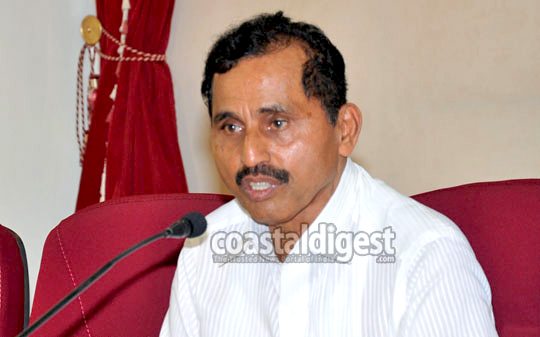Mangaluru, Jun 4: A day after district in-charge minister B Ramanath Rai brushed aside the “shocking” allegations made against him by former Congress leader Harikrishna Bantwal, the latter on Tuesday threw the gauntlet to the former inviting him for a truth test at Sri Kshetra Dharmasthala.
“Let Mr Rai come Dharmasthala and swear on deity, Sri Manjunatha Swami, that he hasn’t abused senior Congress veteran B Janardhana Poojary,” Mr Bantwal challenged at a press meet. “Manjunatha Swami is our ‘court’. If Mr Rai has really not said anything he will definitely come to Dharmasthala. If he does not turn up within a week, we should realize that he abused for sure,” he added.
“Mr Rai could have just apologized to Mr Poojary and end the issue there. Instead, he took six days to persuade Congress leaders Arun Coelho and Tejaswi Raj. When that did not work, Rai told the media that the whole incident did not happen and he was being falsely accused,” said the Billava leader.
He went on to claim that Mr Rai can be booked under Section 506 of the IPC. “But we do not believe in playing dirty politics and hence do not want to go ahead and file a complaint,” he said.
Mr Bantwal played an audio clipping in front of media persons and claimed that it was Arun Coelho speaking. “I am ready to tell this truth in front of anybody you want me to,” said the male voice in the clip.
He further said: “The minister does not respect Mr Poojary. If he did, he would at least make a call and invite him for yesterday’s program in the Congress Office. His claims of lobbying for Mr Poojary in Delhi during last Lok Sabha polls are also false as the candidate was finalized through internal polls in Managluru. Sonia Gandhi doesn’t even know this Rai personally.”
Mr Bantwal lamented that in the last four years, neither Chief Minister Siddharamaiah nor local Congress stalwarts like U T Khader and Mr Rai asked for Mr Poojary’s opinion before nominating for party posts.
He claimed that he met Mr Khader in Fr Muller’s Hall after the latter called for a press meet in the city on Sunday. He said that when he discussed the issue, Mr Khader said that he had his own issues to deal with. He added that he feels Mr Khader’s ‘issues’ could be nothing other than his political position and gains.
“I am not part of any party. So I cannot politically benefit out of any of this. The incident of Mr Rai abusing Mr Poojary in the wedding happened near the entrance of the hall and not on the main stage. That is why not many people know about it,” he said.
Also Read: Ramanath Rai called Poojary “Ra***maga”: Harikrishna Bantwal





Comments
This brahmin kalladka prabhakar bhat sent his son and family to western country to study and misusing lower caste people for his political agenda wake up hindu community try to understand manuvaadi
Add new comment